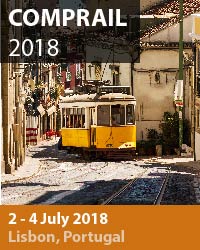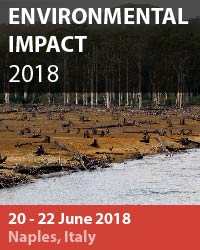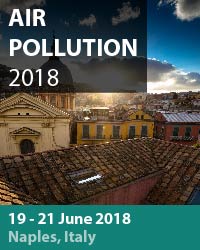16th International Conference on Railway Engineering Design & Operation
2 - 4 July 2018
Lisbon, Portugal
Overview

The 16th International Conference on Railway Engineering Design & Optimisation (COMPRAIL 2018) took place in Lisbon, Portugal. The Conference was organised by the Wessex Institute, UK and represented by Prof. Giorgio Passerini, member of the WIT Board of Directors.
Prof. Norio Tomii of Chiba Institute of Technology, Japan and Eng. Jose Manuel Mera, Politechnic University of Madrid, Spain, Co-chaired the Conference together with Prof. Passerini.
The conference, which started in Frankfurt in 1987, is held every two years in different locations around the world attracts a variety of specialists interested in the development of railways, including managers, consultants, railway engineers, designers of advanced train control systems and computer specialists. It provides a forum for researchers, academics and practitioners involved in railway engineering to present and discuss the latest developments.
Opening of the Conference
The Conference was opened by Giorgio Passerini who welcomed the delegates to the conference, before paying tribute to the founder of the Wessex Institute, the late Prof. Carlos A Brebbia.
Giorgio then mentioned that the main objective of WIT is the dissemination of knowledge, with particular emphasis on science and engineering. Another way in which this is achieved is by the publication of papers from conferences and Journals, through its publishing arm, WIT Press.
Prof. Jose Manuel Mera, also welcomed the delegates to Lisbon and made a brief speech also to remind the last conference held in Madrid and the co-operation with the Wessex Institute and the late Prof. Brebbia.
Invited Speakers
There were a series of invited lectures on advanced topics of research and applications, as follows:
- “Transient stability of a rotatory frequency converter fed railway, interconnected with a parallel low frequency high voltage transmission system”, by John Laury, Lulea University of Technology, Sweden.
- “Impact of the method of rail track routing on the thermal regime of subgrade structure – numerical modelling of non-traffic load”, by Stanislav Hodas, University of Zilina, Slovakia.
- “Enhanced efficiency in railway driving: development of ECOS (energy consumption optimization software) tool”, by Jose Manuel Mera, Polytechnic University of Madrid, Spain.
- “Train rescheduling generation considering rolling stock types and closed-off area”, by Teruomi Katori, Nihon University, Japan.
- “Random delays forming in the dense train flow”, by Boris Davydov, Far Eastern State Transport University, Russia.
- “Contribution to the modification of input data of subgrade structure dimensioning for non-traffic load according to the ZSR methodology”, by Libor Izvolt & Stanislav Hodas University of Zilina, Slovakia.
- “A framework for certification of train location determination systems based on GNSS for ERTMS/ETCS” by Ales Filip, University of Pardubice, Czech Republic.
- “Recent restoration of skip-stop operation in the Korean urban railway”, by Suk Mun Oh, Korea Railroad Research Institute, South Korea.
- “Noise reduction for ballasted track: a multi-dimensional analysis”, by John Armstrong, University of Southampton, UK.
Conference Sessions
The papers presented during the Conference were classified under the following session headings:
- Advanced train control
- Energy supply and consumption
- Scheduling
- Operational planning & quality
- Computer simulations
- Train control systems
- Safety and security
- Risk management
- Railway vehicle dynamics
- Intelligent railway systems
- Track and design maintenance
There were numerous occasions for holding informal discussions during the coffee breaks and the excellent complimentary lunches that the hotel prepared.
Conference Publication
Papers presented at this conference will appear in Vol. 181 of the WIT Transactions on the Built Environment (ISSN 1743-3509). All papers presented at the meeting since the 1994 conference are available Open Access in the eLibrary of the Wessex Institute (https://www.witpress.com/elibrary), from where they can be freely downloaded by any interested parties.
A few papers have been selected for publication in the International Journal of Transport Development and Integration. This Journal covers all transportation modes and the general topic of transport systems, with particular emphasis on their integration and harmonisation. The customers’ requirements for better transportation systems and the need for a healthier environment are topics covered by the Journal. The Journal also reports on advanced railway transport modes. The variety of topics covered by the Journal reflects the complex interaction of transportation systems and the environment, and the need to establish integrated strategies.
ISAC Dinner
The meeting of the International Scientific Advisory Committee (ISAC) of the Conference took place over dinner. The meeting focused on the discussion of which new topics should be included in the Call for Papers, aiming for the continuous evolution of the conference. Other topics of discussion were the organisation of the Committee and the location for the 2020 conference.
Conference Dinner
The Conference banquet took place within the Castle of St George, where the delegates were given a unique opportunity to visit the Castle after closing time, without any other tourists present. The venue was the wonderful restaurant situated within the castle, with windows that allowed the guests to continue admiring the wonderful panorama. Giorgio made a brief speech to thank delegates and to say that COMPRAIL always attracts a big number of delegates and a high level of papers.
Closing of the Conference
The conference was closed by Giorgio, who thanked the delegates for attending and hoped that they would consider attending COMPRAIL 2020 as well as other WIT conferences. Giorgio said that the meeting had been highly successful in terms of quality of the presentations and the number of discussions that took place during the conference.
Related Conferences
Urban Transport 2018, 19 - 21 September 2018
ERES 2019, 5 - 7 June 2019
Urban Transport 2019, 25 - 27 June 2019
SAFE 2019, 23 - 25 September 2019
Disaster Management 2019, 25 - 27 September 2019

